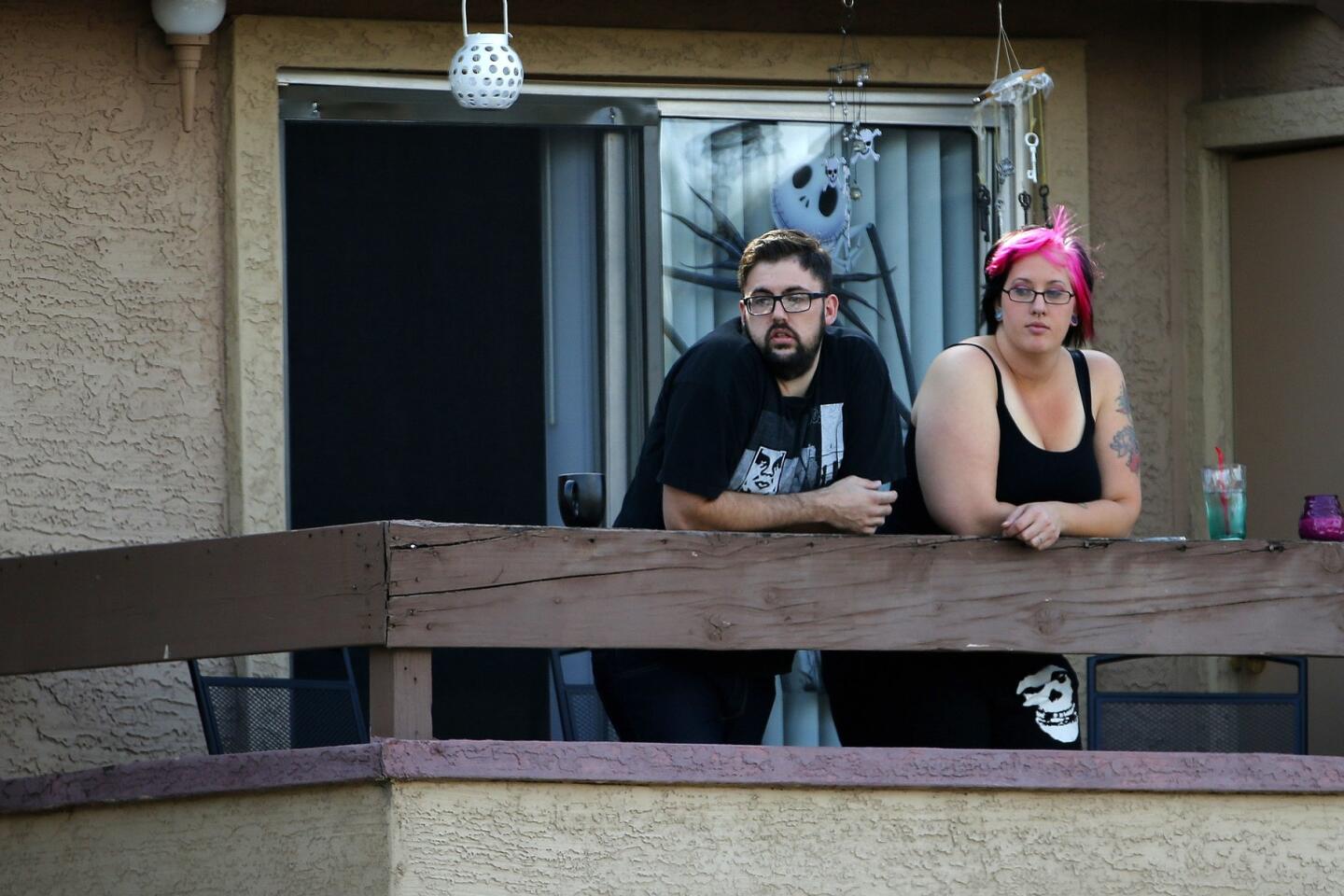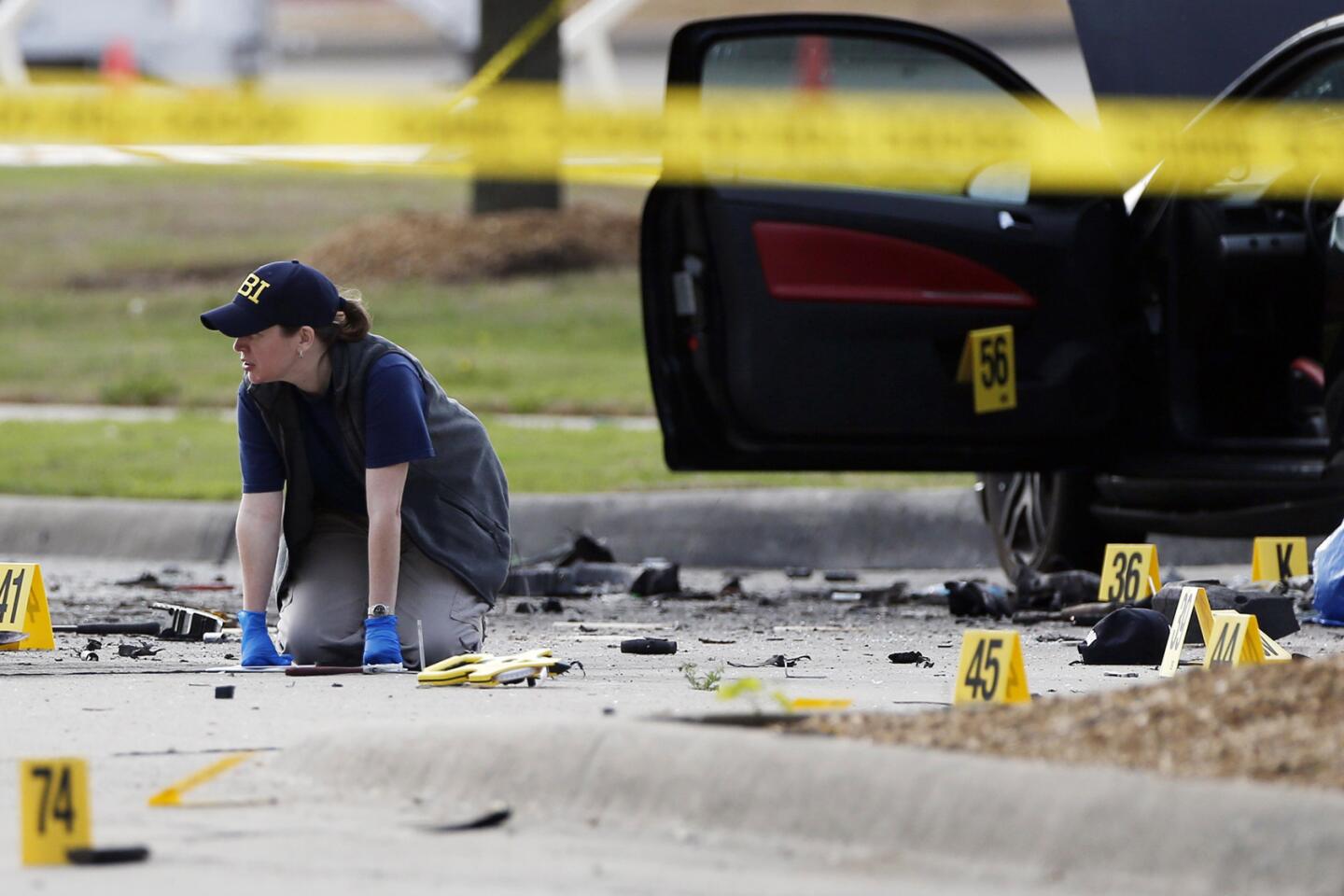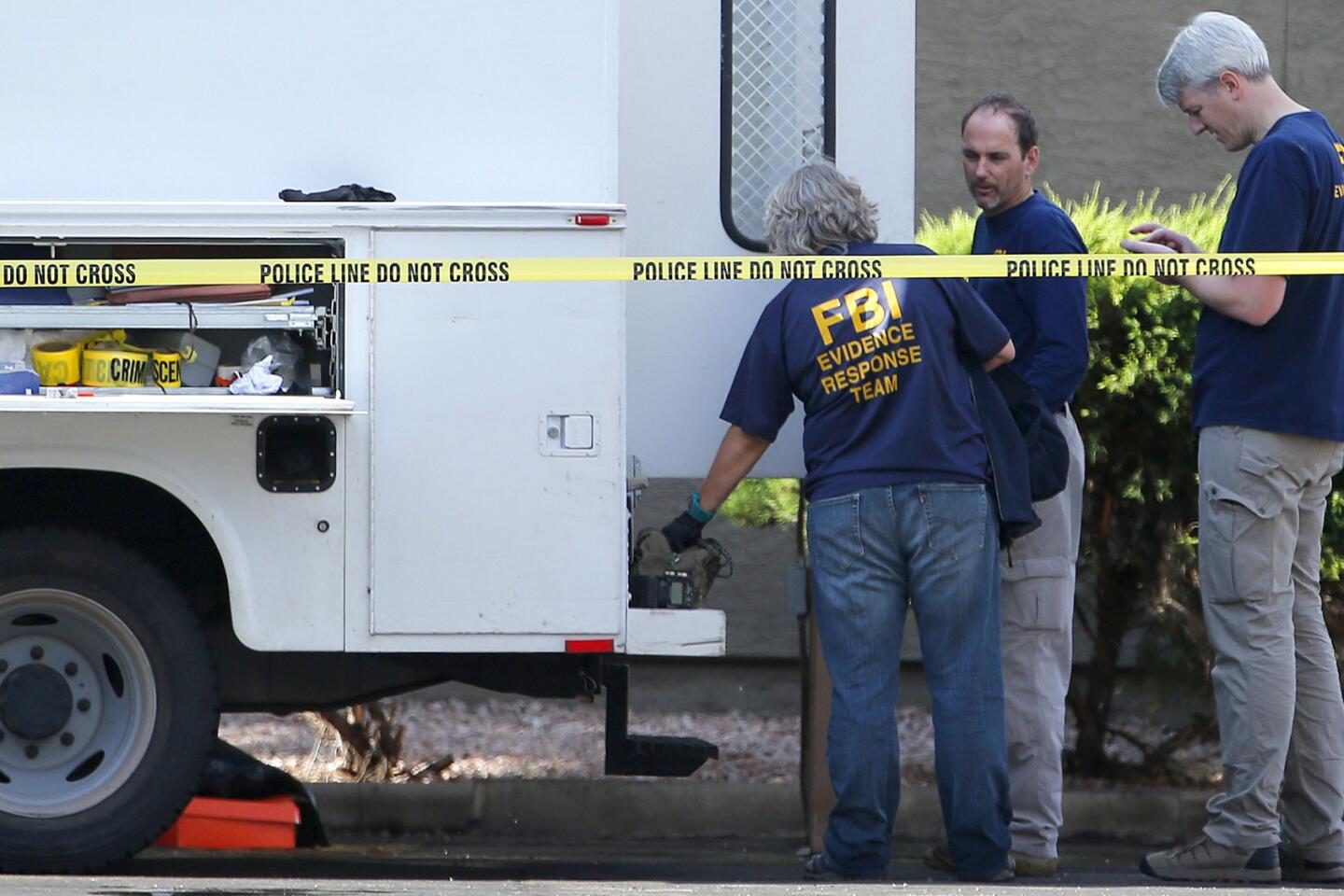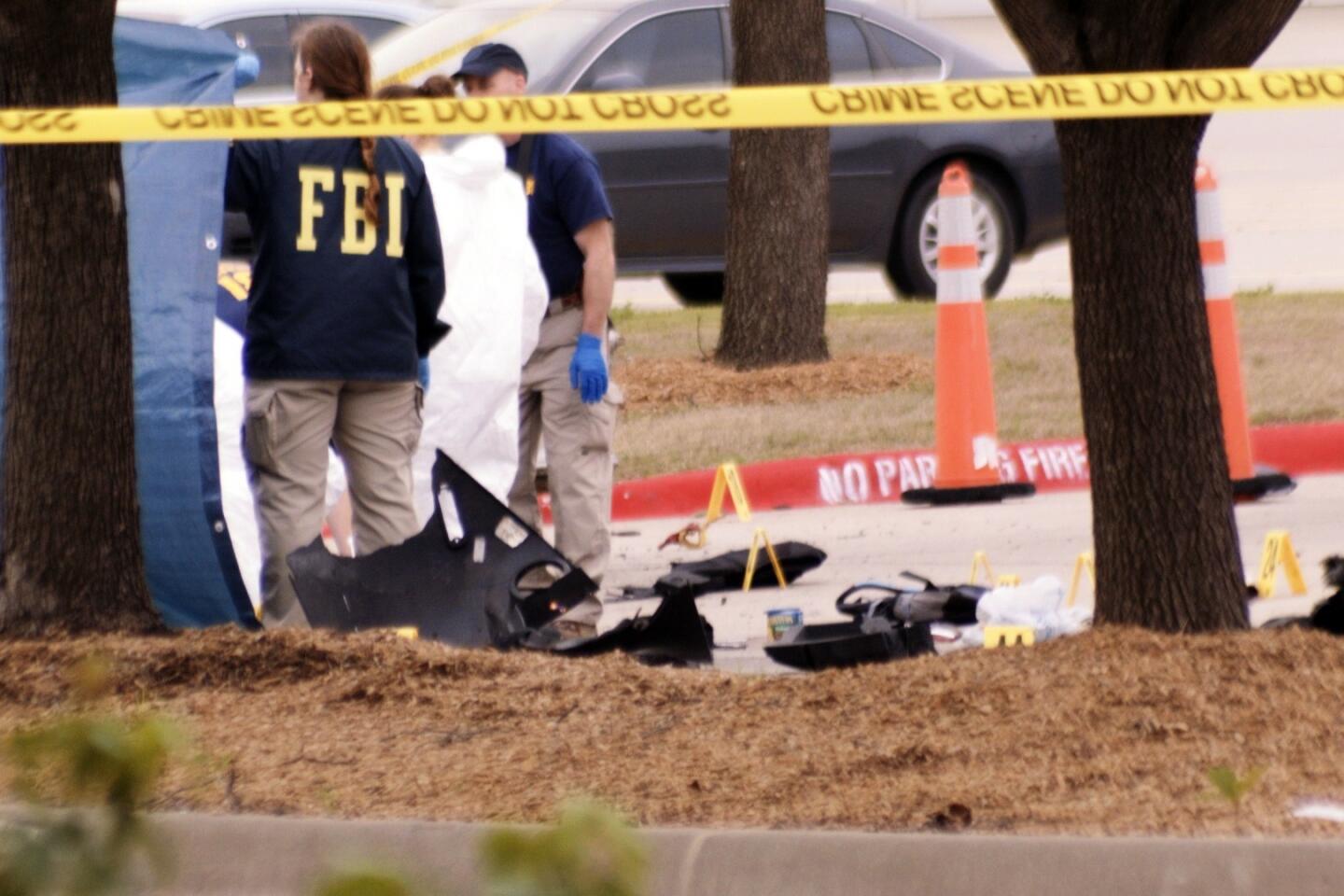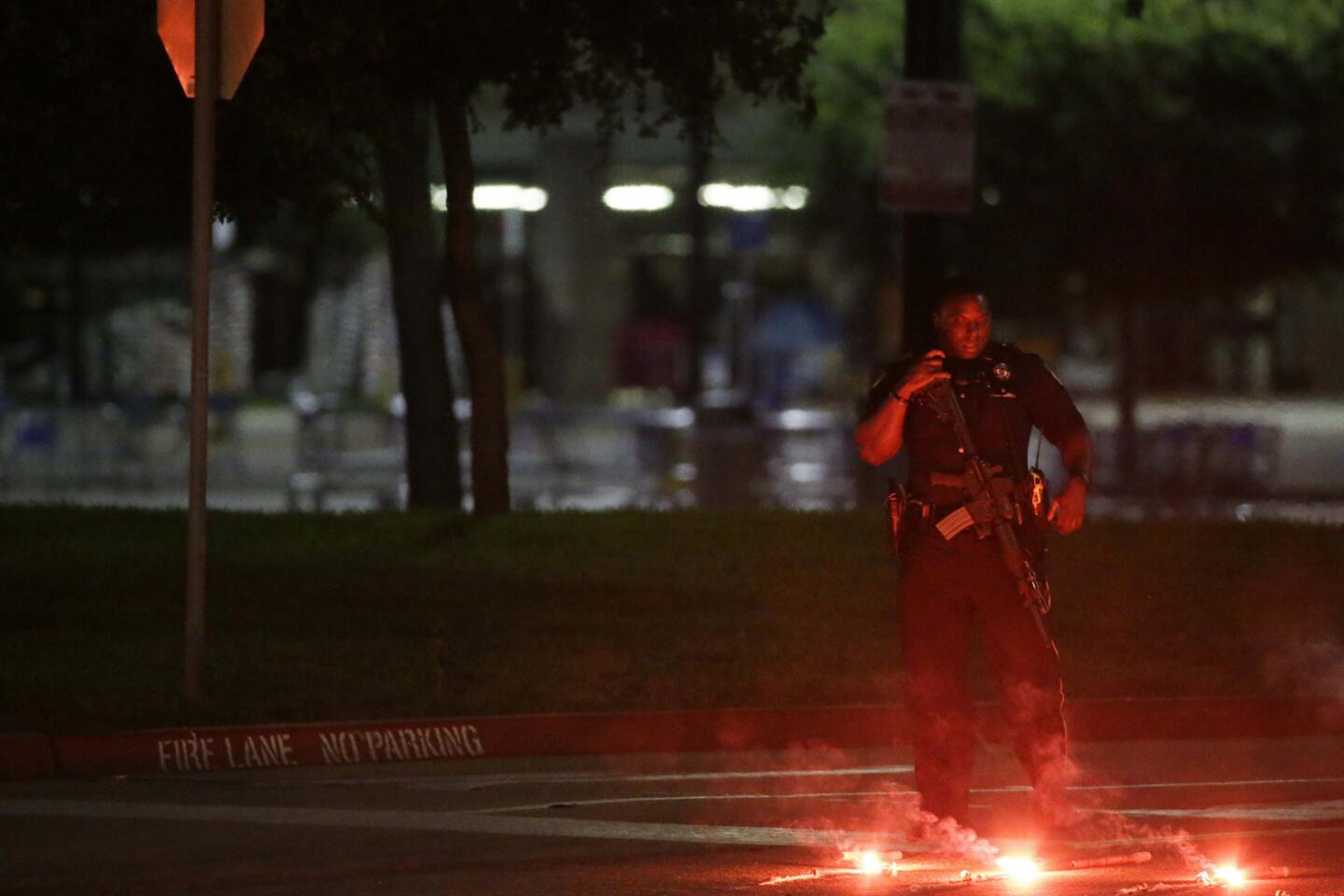Texas attack refocuses attention on fine line between free speech and hate speech
- Share via
Reporting from Garland, Texas — Pamela Geller is a 56-year-old Jewish arch-conservative from New York, a vehement critic of radical Islam who organized a provocative $10,000 cartoon contest in this placid Dallas suburb designed to caricature the prophet Muhammad.
Elton Simpson was a 30-year-old aspiring Islamic militant from Phoenix who fantasized to an FBI informant about “doing the martyrdom operations” in Somalia and was convicted in 2010 of lying to the FBI about his plans to travel to the volatile eastern African nation.
Their lives intersected Sunday in this small town in north-central Texas, an unlikely venue for a violent collision of cultures. After a Sunday evening shootout outside the contest site between police and Simpson and another man firing assault rifles, both gunmen lay dead in the street. And Geller quickly posted a defiant blog: “This is a war on free speech. ... Are we going to surrender to these monsters?”
The Texas showdown was America’s Charlie Hebdo moment, erupting just four months after gunmen shot and killed 12 people at the Paris offices of the satirical newspaper that had published cartoons of the prophet considered blasphemous by many Muslims. The Garland attack refocused public attention on the fine line between free speech and hate speech in the ideological struggle between radical Islam and the West.
The shooting unfolded just before 7 p.m. Sunday outside the Curtis Culwell Center, a public school building where about 200 people had just heard an impassioned anti-Islamic speech — “The less Islam, the better!” — by Geert Wilders, a right-wing Dutch politician. Wilders said the venue was significant: It was chosen as a defiant response to an American Muslim group that had held a “Stand With the Prophet Against Terror and Hate” conference in January in the same building.
Security had been intense, with officers from local police, SWAT teams, a bomb squad and school security, along with FBI and other federal agents waiting for trouble, and it came: The two men pulled up and opened fire but were quickly shot and killed by a Garland police officer firing his service handgun.
“He did what he was trained to do and did a very good job,” Garland police spokesman Joe Harn said. “He probably saved lives.”
Harn said of the gunmen, “Obviously, they were there to shoot people.” He said they wore some form of body armor, and police found ammunition — but no explosives — in their car.
In Phoenix on Monday, police searched Simpson’s home. A federal law enforcement source said Nadir Soofi, 34, identified as the second gunman, was Simpson’s roommate.
The cartoon contest was organized by Geller as a rallying point for cartoonists and conservatives united in their belief that verbal attacks on radical Islam are a form of free speech.
Geller has posted bus ads and billboards condemning Islam. In 2010, the same year the FBI was investigating Simpson’s vows to fight “kafirs,” or nonbelievers, Geller cofounded American Freedom Defense Initiative, also known as Stop Islamization of America. The organization, considered a hate group by the Southern Poverty Law Center, hosted the Muhammad Art Exhibit and Cartoon contest, offering $10,000 for the best cartoon of the prophet.
“We know the risks,” Geller wrote in a blog promoting the event. “This event will require massive security.”
Police said the gunmen drove a sedan up to a police car blocking access to the conference, jumped out and opened fire with assault rifles. A school security guard was wounded in the leg.
A tweet from an account called “Shariah Is Light” was posted under the hashtag #texasaattack at 6:35 p.m. Sunday, about 15 minutes before the shootout. It appeared to predict an impending attack:
“The bro with me and myself have given bay’ah [oath of allegiance] to Amirul Mu’mineen [a caliphate leader, possibly Abu Bakr Baghdadi, leader of Islamic State]. May Allah accept us as mujahideen [holy warriors]. Make dua [a prayer of supplication].”
The avatar on the Twitter account featured the image of Anwar Awlaki, an American Islamic militant aligned with Al Qaeda who was killed in an American drone strike in Yemen in 2011. It is not clear whether Simpson or Soofi posted the tweet.
The Middle East Media Research Institute said it believed the Twitter account belonged to Simpson, using the Twitter handle “Mutawakil,” or one who places his faith in God, but that Soofi may have been using it in recent days.
The institute said the account was frequently shut down for spreading jihadist content. The account had regular contact with Islamic State supporters and received messages of congratulations after the attack, the institute said.
Simpson, a plumber’s son who was born in Illinois and converted to Islam in high school, seemed infatuated with Islamic militants in the Middle East, telling an FBI informant in the earlier case against him, “I’m telling you, man, we can make it to the battlefield ... it’s time to roll.”
The FBI paid Simpson’s Phoenix acquaintance, Dabla Deng, $132,000 to secretly record conversations with Simpson. In 2010, Simpson was found guilty of lying to the FBI about plans to travel to Somalia, but a federal judge ruled there was not sufficient evidence to show that the crime was directly connected to international terrorism. Simpson had said he planned to travel to South Africa to study Islam.
Simpson was placed on three years’ probation and fined $600. His mosque in Phoenix had posted his $100,000 bail.
Simpson was a proselytizer, according to his lawyer, Kristina Sitton. He constantly pushed his religion on others — and even on Sitton herself.
“He was kind of a talker, but he seemed harmless,” Sitton said.
“I represented some of the worst of the worst, and I never would have thought he would do this.”
Sitton said Simpson was raised in Florida and moved to Arizona for high school. In 2011, he tried to fly to Ohio for his grandmother’s funeral. At the airport, Sitton said Simpson was told he could not fly unless he went to a side room and talked to the FBI.
In a statement released late Monday by the Phoenix law firm Osborn Maledon, Simpson’s family members said they were “in a state of deep shock.”
“We are sure many people in this country are curious to know if we had any idea of Elton’s plans,” the statement said, according to the Associated Press. “To that we say, without question, we did not.” The statement, which does not identify the relatives, also said the family sends prayers to everyone affected by this “act of senseless violence.”
Usama Shami, president of the Islamic Community Center of Phoenix, remembers Simpson as “a pleasant kid” who taught his jump shot to younger children at basketball courts near the mosque. Simpson attended the mosque beginning in his high school years, Shami said, and was active until just months ago.
“We didn’t see him too much lately,” said Shami, whose mosque is about two miles from the apartment shared by Simpson and Soofi.
Simpson was gregarious and personable, Shami said. He described Soofi as older and quieter. He said Soofi moved to Phoenix from Texas and would sometimes come to the mosque with his young son.
Soofi owned a pizza parlor, Cleopatra Bistro Pizza, but at some point — Shami said he wasn’t sure when — Soofi sold the restaurant, and later appeared to have opened a carpet-cleaning business. He and his wife were divorced in 2013.
Soofi’s Facebook page says he studied at the University of Utah; he was a pre-med student there from 1998 to 2003, a school spokeswoman said. The page posted inspirational Islamic sayings and shared images that were critical of Israel’s treatment of Palestinians and America’s support for Israel.
Attendees at the cartoon contest emerged as defiant as ever after the shootings. The winning cartoonist, Bosch Fawstin, posted a tweet shortly after the attack: “They came to kill us and died for it. Justice.”
Fawstin’s winning cartoon portrayed Muhammad as a wild-eyed zealot brandishing a sword and proclaiming, “You can’t draw me.” The hand of an unseen cartoonist responds, “That’s why I draw you.”
One of Fawstin’s Twitter followers posted a comment saying his favorite drawing at the event was “the two chalk lines out front,” referring to the bodies of the two gunmen.
K.M. Lessing, a Texas resident who attended the event, said there was no panic in the building after the shooting. She said she had expected an attack.
“We have a right to have these kind of events, and we shouldn’t have to live in fear of a shooting happening,” Lessing said. “And of course it did, which proves the whole point.”
The shooting, she said, “is exactly why I’m anti-Islam.”
In his speech just before the shooting, Wilders, the Dutch politician, said of Islamic activists: “They want to prohibit cartoons, books and films which they find insulting. Our answer is clear: Don’t mess with Texas! Don’t mess with the free West! Don’t mess with our freedom of speech!”
“My event was about freedom of speech, period,” Geller told CNN on Monday, rejecting the idea that it was irresponsible to host such an event in light of the Charlie Hebdo attacks. “It’s dangerous because we’re increasingly abridging our freedom of speech so as not to offend savages.”
On the ninth anniversary of the Sept. 11, 2001, attacks, Geller stood before thousands of people chanting, “No mosque here!” near the site of the fallen World Trade Center buildings.
Addressing New York’s mayor in 2010, Michael R. Bloomberg, Geller demanded to know why he was not blocking the proposed opening of an Islamic center near the site. “I want to ask Mr. Bloomberg,” she bellowed into a microphone. “Tell us, please, do you sleep well?”
Geller has since catapulted her American Freedom Defense Initiative into the public eye and into the crosshairs of enemies. The Texas attack was the first against her New York-based group, but not the first time critics have sought to silence her.
Geller won a victory last month when a U.S. district judge ordered New York’s Metropolitan Transportation Authority to let her group post ads in subways showing a man in a head scarf and the words, “Killing Jews is worship that draws us close to Allah. That’s his Jihad. What’s yours?”
Critics had fought the ads on grounds they could incite violence. The judge called them “offensive” but said they were protected by the 1st Amendment. It was Geller’s second victory over the MTA, which in 2012 lost a battle to prevent ads in the subways that included the words, “Support Israel, defeat Jihad.”
The group was described in 2013 tax documents as a nonprofit “dedicated to freedom of speech, freedom of conscience and individual rights under the law.” It listed contributions and grants that year of more than $958,000, compared with $157,855 the year before. Geller, its president, is paid about $200,000 a year, according to the group’s filings.
Geller worked for the Daily News in New York and served as associate publisher of the New York Observer before turning full time to what critics consider her campaign of Islamaphobia.
She has no academic credentials as an expert in Islam or jihad. But through her blog, Atlas Shrugs, and her willingness to espouse harsh views of Islam, Geller has gained a following that includes John R. Bolton, the former U.S. ambassador to the United Nations, who spoke via video link in support of her at the 2010 New York protest.
Heidi Beirich, intelligence project director at the Southern Poverty Law Center, said there was no comparison between Geller’s group and Charlie Hebdo.
“Charlie Hebdo was an equal opportunity mocker,” Beirich said of the Paris newspaper, which was to be honored in New York on Tuesday by the PEN American Center literary group despite a boycott by several prominent authors. “All she does is bash Muslims. That’s it.”
Ibrahim Hooper of the Council on American-Islamic Relations said Geller’s claim to be a defender of free speech was laughable because she had tried unsuccessfully to block Al Jazeera from expanding into the United States in 2011.
“It’s just so hypocritical. She’s regularly trying to silence Muslim organizations and Muslim academics and then claims to be a champion of free speech,” Hooper said.
Holding the cartoon contest exposed Geller to attack from Muslims determined to defend Muhammad’s honor, said Daniel Akbari, an Iranian Islamic scholar who said he had defended death penalty cases in Iran.
The penalty for insulting Muhammad is death, Akbari said in an interview Monday. He said Muslims believed that anyone who is hostile to or opposes Muhammad is condemned to the “fire of hell.”
“Any act that will send one to hell in the afterlife warrants the punishment of death in this life,” Akbari said.
Akbari said the central issue in the Texas shootings was not strictly the prohibition against depicting Muhammad but the grave insult involved.
“Drawing caricatures of Muhammad is per se insulting under sharia,” or Islamic law, Akbari said.
Aboard Air Force One en route to New York, White House spokesman Josh Earnest said Monday that President Obama was informed of the shooting Sunday night.
“There is no act of expression, even if it’s offensive, that justifies an act of violence,” Earnest told reporters.
The Council on American-Islamic Relations condemned the attack.
“Violence in response to anti-Islam programs like the one in Garland is more insulting to our faith than any cartoon, however defamatory,” the group said in a statement. “Bigoted speech can never be an excuse for violence.”
david.zucchino@latimes.com
Kaiman reported from Garland, Susman from New York and Zucchino from Durham, N.C. Times staff writers Matt Pearce and Brittny Mejia in Los Angeles, Nigel Duara in Phoenix and Richard A. Serrano in Boston contributed to this report.
More to Read
Sign up for Essential California
The most important California stories and recommendations in your inbox every morning.
You may occasionally receive promotional content from the Los Angeles Times.
